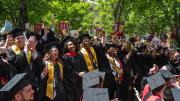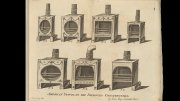How do you know that the University’s 372nd Commencement, conducted this morning, represented a complete return to post-pandemic normalcy? For one thing, conversation before the Big Day focused on whether the weather would be fair for the singing of “Fair Harvard”—rather than on vaccination, social-distancing protocols, and masking etiquette.
Officially, the federal and Massachusetts COVID-19 public health emergencies ended May 11. Locally, Harvard University Health Services executive director Giang T. Nguyen, an omnipresent email correspondent during the pandemic, advised the community on May 8 that anyone who tested positive should isolate for five days and mask until day 11, and reminded all that “there is still substantial COVID-19 circulating in the region.” But his tone was softened: “I recommend” that those planning to attend Commencement “consider” taking a rapid antigen test (but, more sternly, “do not attend” if any symptoms appear). Then he pivoted to year-end events that “can be both exciting and stressful. Remember to prioritize your well-being and mental health. Additionally, remember to celebrate responsibly.” At this point, for most people, the emphasis was on celebration.
The (Transition) Year That Was
Following last year’s trifecta—Commencement for the class of 2022; the joyful graduation celebration for the pandemic-diverted classes of 2020 and 2021; and the first in-person Alumni Day—Lawrence S. Bacow announced he would step down as Harvard’s twenty-ninth president at the end of the 2022-2023 academic year.
He put the year to full use, advancing major Harvard priorities and suggesting a University fully up to snuff after the disruptions of the prior two years.
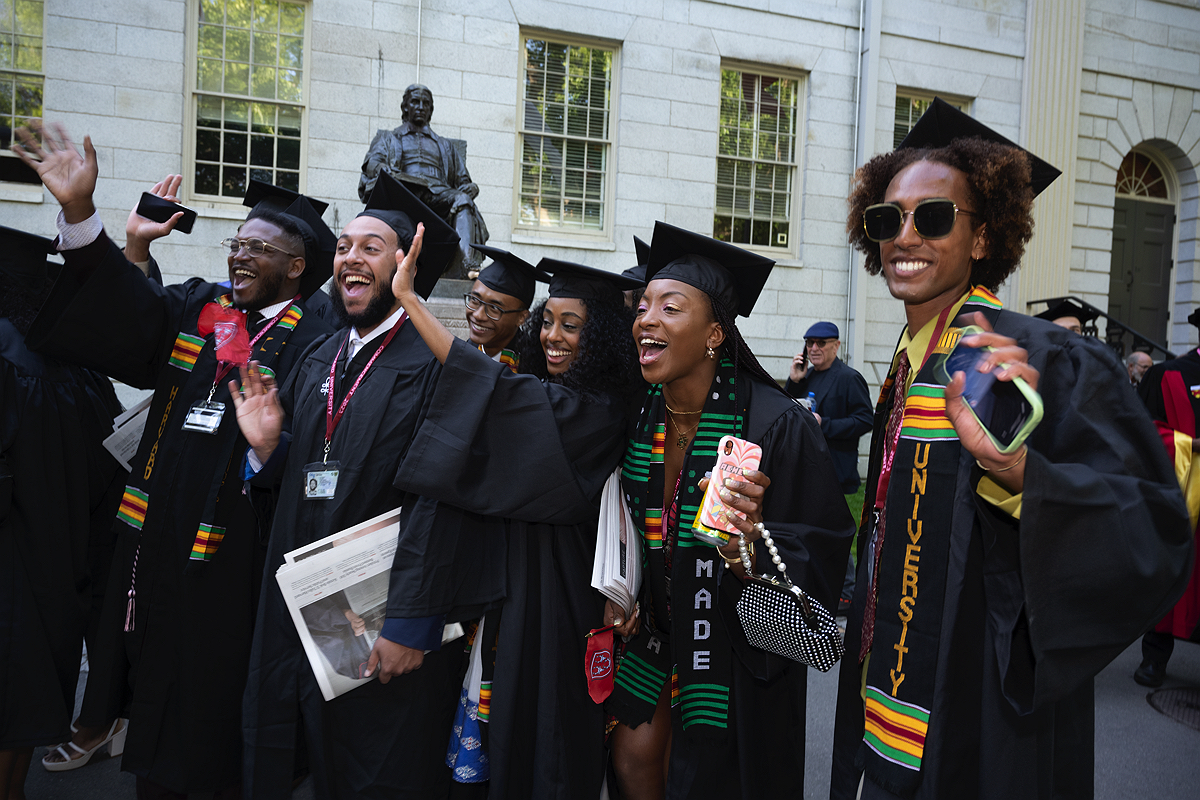
Photograph by Jim Harrison
A couple of weeks after his announcement, Bacow was able to report a $200-million gift to underwrite research and teaching on climate change and sustainability, launching the Salata Institute (which has since funded its initial multidisciplinary research grants and convened a University-wide climate symposium).
In July, Boston regulators approved the first phase of the commercial “enterprise research campus” scheduled to be developed in Allston, across Western Avenue from the Business School. Although current economic conditions may delay construction, securing permission to proceed was a major step toward realizing the vision for the project Bacow has advanced. Combined with the opening, finally, of the science and engineering complex on Western Avenue in 2021, the regulatory green light brought decades of speculating about Allston campus development much closer to realization.
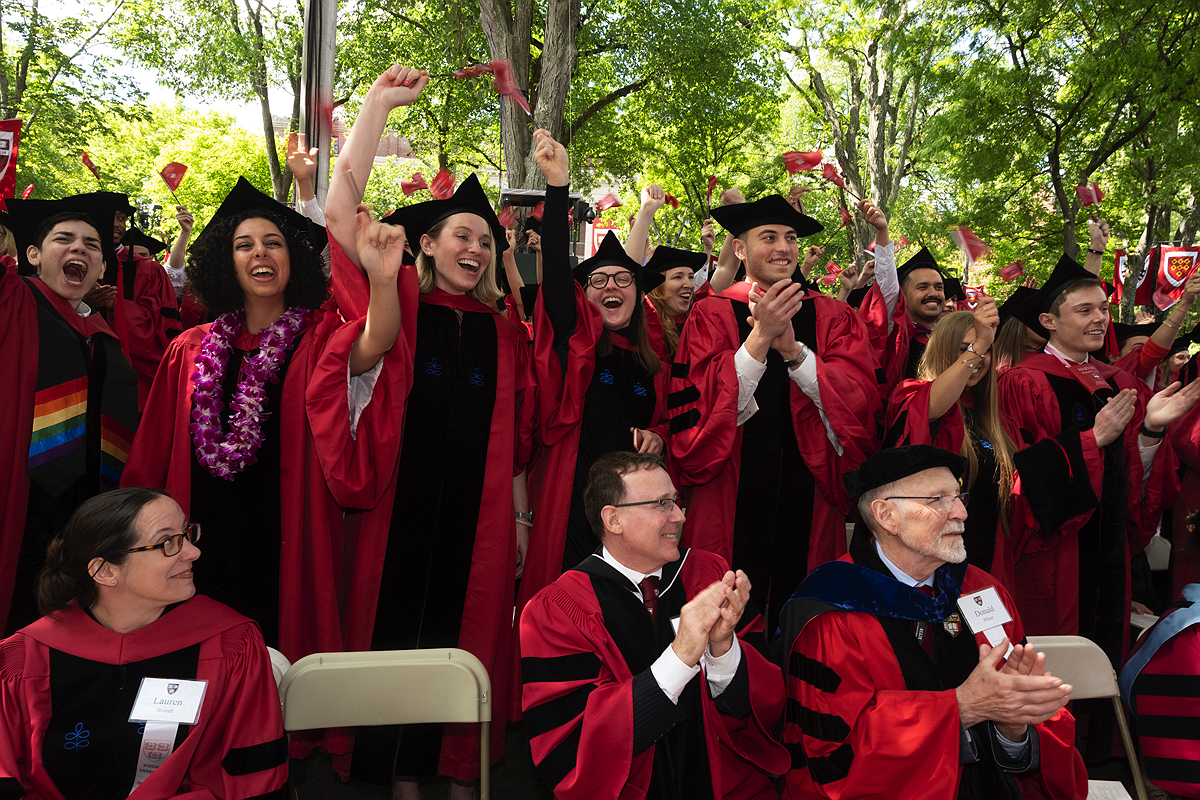
Exultant Ph.D. graduates celebrate their admission into the “ancient and universal company of scholars.”
Photograph by Jim Harrison
The Kempner Institute for the Study of Natural and Artificial Intelligence—the locus of Bacow’s goal of establishing Harvard as a center for AI research and education—introduced itself with a September event featuring founding funders Mark Zuckerberg ’06, LL.D. ’17 and Priscilla Chan ’07, faculty experts, and alumni leaders from enterprises such as Amazon, Google, and Microsoft.
Work on the recommendations from the task force on Harvard and the legacy of slavery proceeded throughout the winter and spring—with efforts begun to memorialize on campus those enslaved, trace their descendants, and build academic relationships with Historically Black Colleges and Universities.
As those programs proceeded, Bacow himself resumed traveling extensively, with significant outings to Europe, Texas, and the Middle East (pandemic-delayed spring-break visits with alumni, students, and academic officials in Jordan, Israel, and the West Bank).
But he was very much at home and on hand at Smith Campus Center last December 15, when the Corporation, with the consent of the Board of Overseers, concluded its swift search, choosing a homegrown talent to be his successor: Claudine Gay.
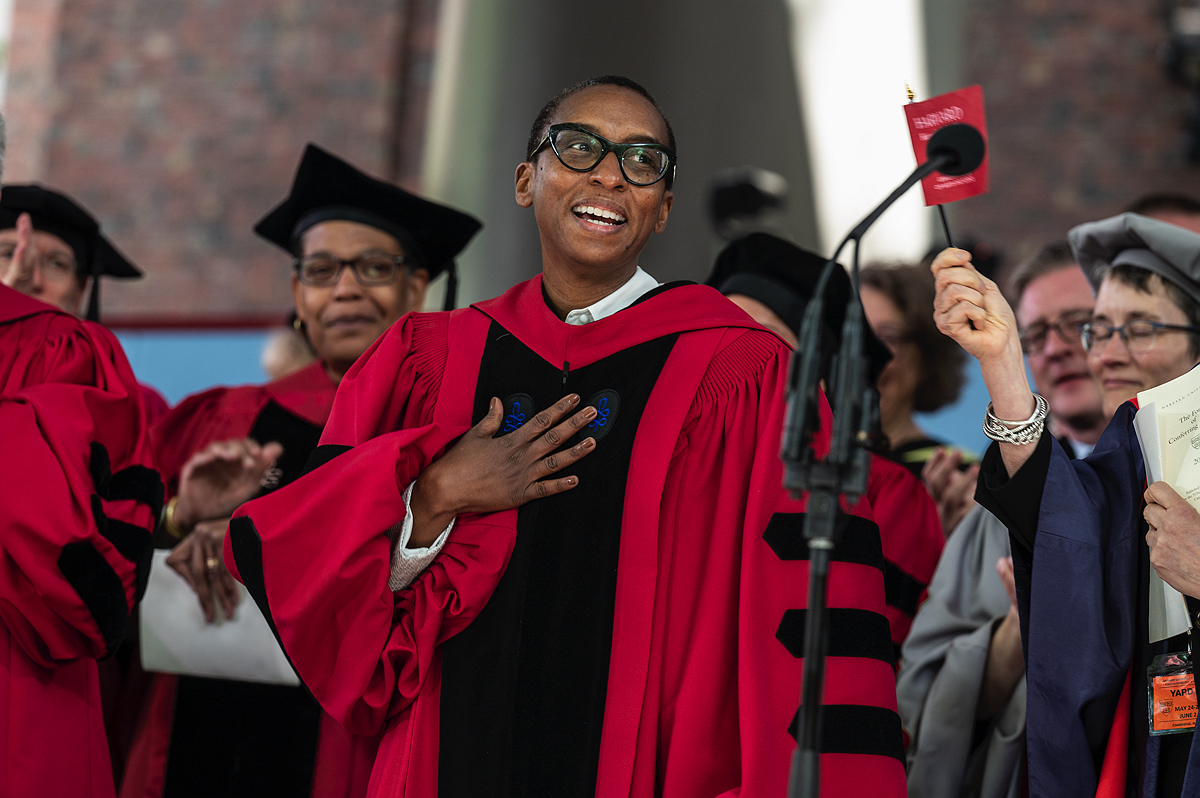
President-elect Claudine Gay
Photograph by Jim Harrison
Beyond the precedent Gay’s election as the thirtieth leader sets—the daughter of immigrants from Haiti, she is Harvard’s first black president—it also represents important continuities. Bacow had appointed her dean of the Faculty of Arts and Sciences (FAS) in July 2018: the first major personnel announcement of his then-nascent administration. True, she is the first FAS dean to move to Massachusetts Hall—but the appointment of an internal candidate with Harvard faculty and administrative experience certainly ought to ease the presidential hand-off. She is broadly familiar with current priorities like investments in AI and quantum-science research, and the climate and legacy of slavery initiatives.
So, changed as the University and its people surely were by the pandemic, Harvard has emerged embracing new academic opportunities as it always has, while effecting a smooth leadership transition. Call it the Crimson new normal.
As for the weather-watchers: eastern Massachusetts had an early, lush spring. For once, the campus was in peak bloom as Commencement celebrants convened. At Loeb House, where the governing boards meet, rhododendrons, laurels, irises, peonies, alliums, and dogwoods were all doing their thing—perhaps a favorable judgment on the transition effected within. Even the yellowwood trees planted in Harvard Yard decades ago to bloom during early-June Commencements (but since befuddled by climate change) managed to synch their schedules to set their racemes of buds on time this year. Two inches of rain drenched southern New England on Saturday, May 20, clearing the air for yet another sunny, comfortably cool, clement Crimson Commencement week. Showers Wednesday evening moistened the candidates for honorary degrees and University guests en route to the gala dinner in Annenberg Hall, but that was a false flag: Commencement morning dawned brisk, brilliantly clear, and with temperatures rising through the 50s to the high 60s by afternoon—ideal for wearing a cap and gown. Normalcy restored.
A Phi Beta Kappa Warning, and Baccalaureate Counsel to Humility
During the Phi Beta Kappa Literary Exercises Tuesday morning, May 23—the traditional, and intellectually resonant, beginning to the week’s events—poet Natalie Diaz described her work as “a practice of attention and intention, of understanding the power of story, of how story holds us, and how we hold others in it, whom we include or leave out, whom we let fall or pick up.” She continued: “Poetry is where I can love who and what are most difficult to love in this world. It is a place where I can hold my brother, who is an addict. It is a place I can hold a country that has done its best to erase me and my people….It is a place where I can treat every body—the body of the river, of land, the body of my brother, a lover, my strangers and my enemies—as the body of the beloved.”
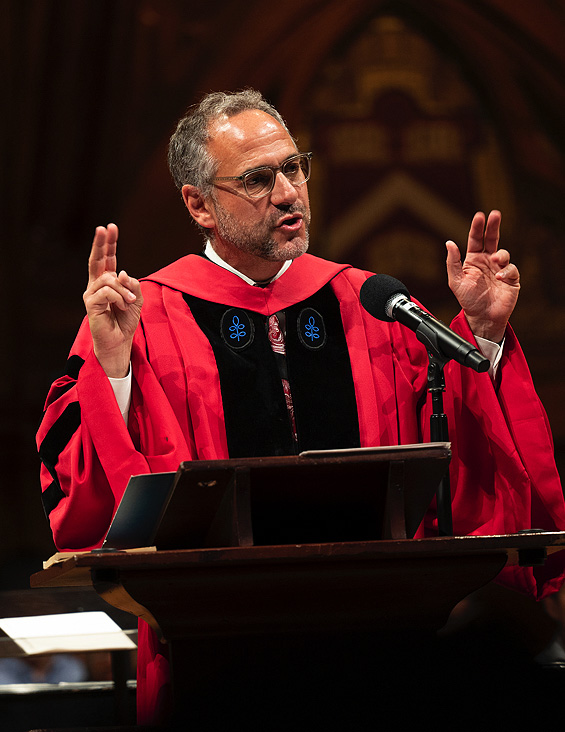
Adam Falk at Phi Beta Kappa
Photograph by Jim Harrison
Orator Adam Falk, Ph.D. ’91—a physicist and president of the Alfred P. Sloan Foundation (and past president of Williams College)—offered tough love of another kind: a sharp speech calling on the distinguished students before him to uphold academic freedom in face of assaults like those he said have proliferated in Florida. He cited the powerful values that bind scholars to each other and to the academy: “a first loyalty to our academic disciplines—not to our governments, nor to our employers, but to our disciplines.” Recalling his own father’s flight from the Nazi suppression of academic institutions, Falk said, that “the destruction of a society’s political freedoms often starts by targeting the universities. Academia, as an institution, is a bulwark against the idea that the state can decide what is acceptable to say, write, and even think.” To the graduates, he said, “Your membership in Phi Beta Kappa gives you the opportunity and, I would say, the obligation, to defend the academic freedom you have so fully embraced in these years at Harvard.”
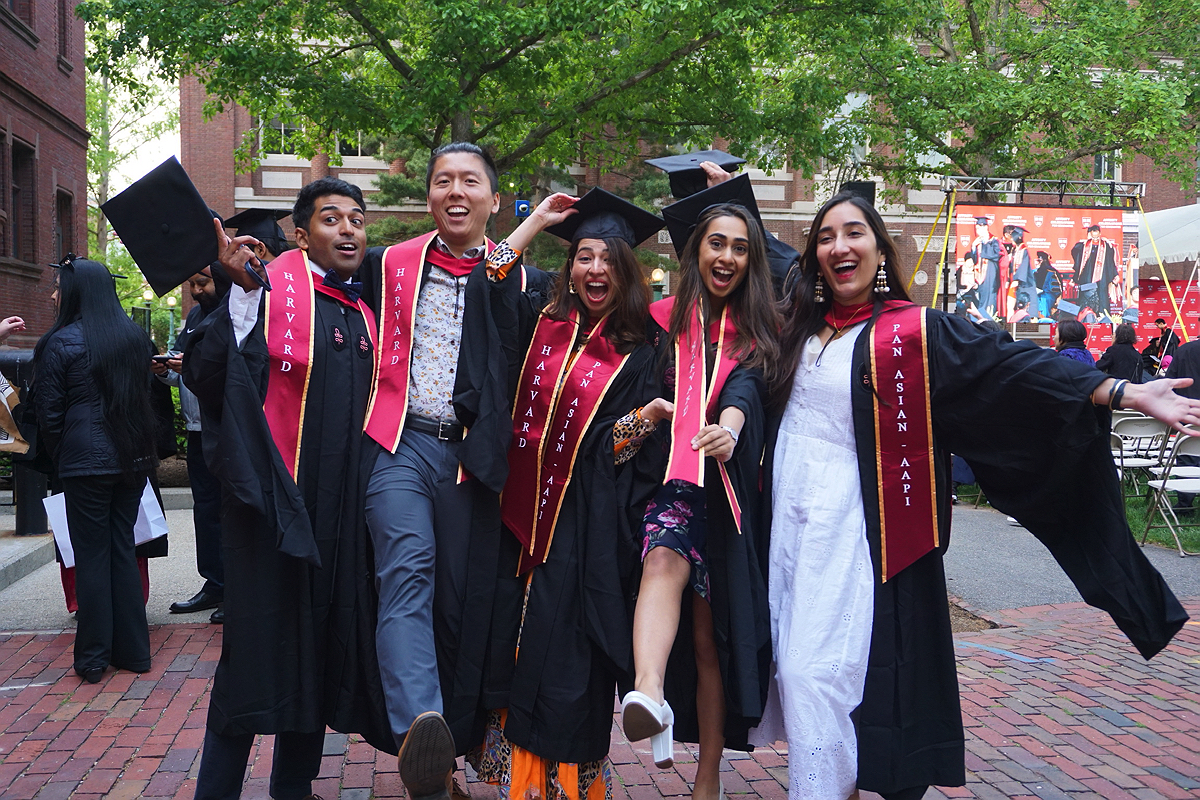
Graduates at the Pan Asian Affinity Celebration
Photograph by Ryan Doan-Nguyen
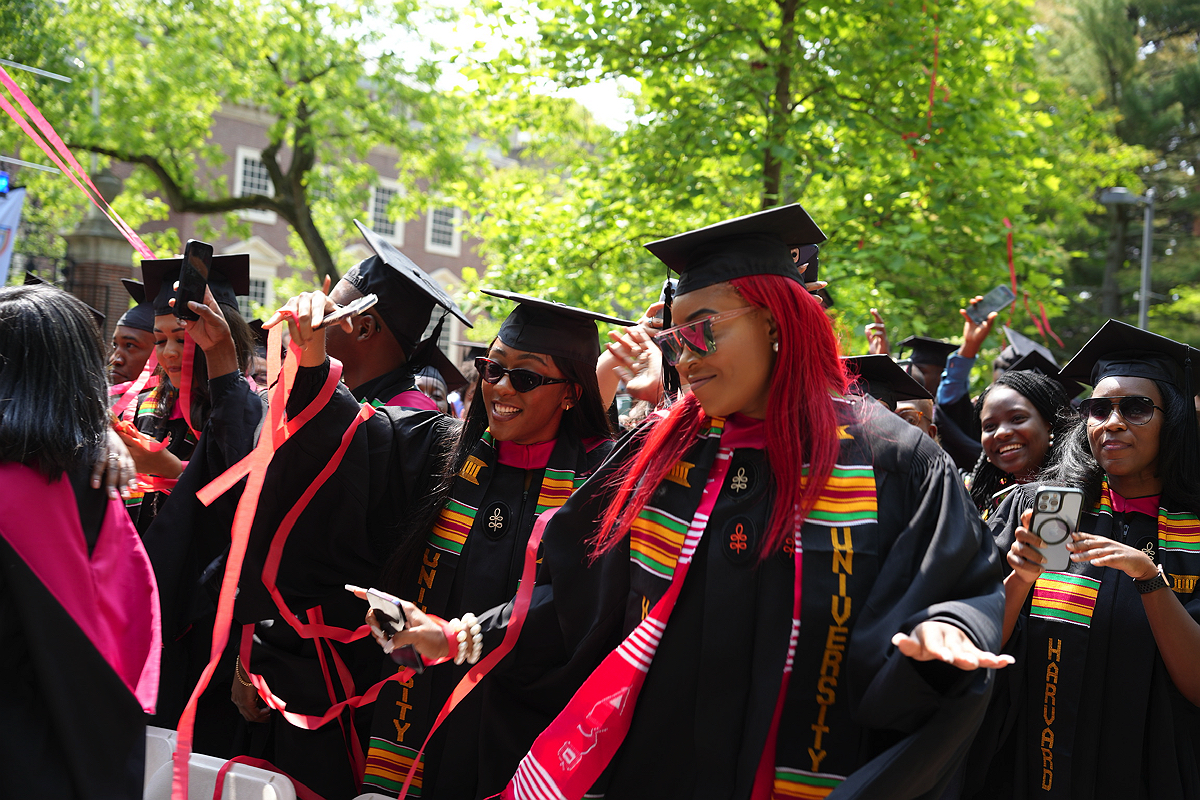
Enjoying Harvard’s affinity celebration for black graduates
Photograph by Ryan Doan-Nguyen
On Monday and Tuesday, the Phi Beta Kappa and baccalaureate traditions were bracketed by eight affinity-group celebrations, organized to recognize soon-to-be graduates representing LGBTQ+, Black, Indigenous, Latinx, Arab, and Asian American, Pacific Islander, and Desi American (APIDA) identities, as well as those with disabilities and those from first-generation, low-income backgrounds. Beyond the students themselves, the events featured performances by members of the Angkor Dance Troupe, Middle Eastern musicians, and Afrobeats Dance Boston, and a virtual rainbow of multicultural clothing. Those identities established, by midday Thursday, all the student participants would take on a new, common one as Harvard Graduates.
In his baccalaureate address to the College seniors Tuesday afternoon, a reflective President Bacow recalled telling the class during his 2019 freshman convocation remarks that “Anyone who is thinking of the next four years as a series of stepping stones to a predetermined outcome is a person who will miss the point of this place.” And how, given the pandemic that ensued. In the turmoil wrought by COVID-19, he said, “I rediscovered the point of this place—and how very much it is the people who define the University—our students, our faculty, our staff.” One lesson he learned anew, he said, is that there is “no way that you can know everything. No matter what your position, whether you are in your first job or, like me, your last, it is OK to say, ‘I don’t know.’ And to do so is not a sign that you are weak; it is a sign that you are confident, that you have the confidence to seek out others who know more than you.”
During the pandemic, for instance, “I learned that I needed the advice and counsel of those who knew far more about the complexities of decisions that were…completely foreign to me. I knew nothing about infectious diseases, other than having had a few of them myself. I knew nothing about epidemiology, virology, or public health. Had I made important decisions without the benefit of counsel from those who are experts in these fields, I would have been guilty of presidential malpractice.” It requires “humility to know that you can never know everything. I would urge you to avail yourself of all the intelligent people at your disposal.”
Modeling that humility, Bacow said that five years earlier, then a semi-retired university president, someone suggested he consider “this job.” He had “looked in the mirror” and “did not see the president of Harvard.…I was not the image of what a Harvard president ought to be.” But his wife advised him otherwise. (“And here I’m going to go a little off script,” he added, “and offer you some unsolicited advice. When you look for a life partner, whoever that happens to be, make sure you find somebody who always brings out the best in you. I got that when I married Adele.”) “Now, it was this wisdom which she had imparted to me at many other points in my career…. So, once she said that, I actually stopped looking in the mirror, I got out of my own way, and here I am standing before you—giving you the last advice I will ever give to a Harvard College class….”
Day Two: ROTC, Class Days, and More
On Wednesday, at the Commencement platform facing Tercentenary Theatre, 16 ROTC graduates were commissioned into the United States armed forces by Lieutenant General Maria B. Barrett of the U.S. Army Cyber Command, among the army’s highest-ranking women. Addressing the cadets, she emphasized that the Constitution “outlines who we are and who we strive to be as a nation—it provides our moral compass”—and contrasted that with conditions prevailing in the Russian military, which requires officers to “unquestioningly carry out the requirements of all military regulations and orders of commanders and superiors,” she said. “So, isn’t it a true blessing that America does not require its officers to obey ‘unquestioningly’ but gives them the opportunity and flexibility for innovation? But with that flexibility come both responsibility and accountability for one’s actions.” She promised them challenging careers as military leaders—“This will be at times hard—with this responsibility comes tough decisions that keep you up at night, high demands, separations from loved ones, plenty of sacrifice and at times, danger”—along with rewards that accompany worthwhile challenges. President Bacow hailed the “intersection of two of our country’s great institutions: the United States Military and Harvard University” at the event, and told the ROTC graduates, “We are incredibly proud of you, as much as the families are that are sitting out here today.”
The class day fare was true to form: some sweet, some serious. Among the former, College Class Day speaker Larry Wilmore—writer, producer and actor—dispensed advice on living, noting that “Most people spend more time planning a two-week vacation than they spend planning their lives.” He urged the young scholars to think more deeply about their paths. Not far away, Michelle Yeoh, her Oscar for Everything Everywhere All at Once still fresh, advised the Harvard Law School degree candidates about “jumping into voids.” She counseled that “The safest thing one can do is remain calm, even curious about the shifting world around you.”
Those life lessons shared, other student cohorts heard more somber messages. At the Harvard Kennedy School, alumnus Ban Ki-moon, M.P.A. ’84, former United Nations Secretary General, was severe in criticizing Russia for “flagrantly” violating international law in invading Ukraine—but he devoted most of his attention to climate change and sustainability. “I regret that we are passing on this impending threat to you,” he said. “But the fact of the matter is that today’s world leaders have thus far failed miserably by putting selfish national interests ahead of urgent, global needs.” Instead of acting, he said, “They have decided to play a dangerous game of chicken.”

Ruth Simmons addressing the Harvard Graduate School of Education
Photograph courtesy of Harvard Graduate School of Education
And on the home front, addressing the Harvard Graduate School of Education, Ruth Simmons, Ph.D. ’73, LL.D. ’02, assailed the recent “attack upon educators.” Recalling her own youth in the Jim Crow South, amid “calls for permanent enslavement of our minds and aspirations,” Simmons said of current attempts to intimidate, curtail, or supplant qualified educators, “We have been here before.” But she remained confident in the ultimate efficacy of teaching and education: “By assuring people’s ability to evolve through learning, we will always have a way out of madness,” she said. “By enlightening others, we have an opportunity to shape a common understanding of our humanity.”
Elsewhere on Wednesday, the Graduate School of Arts and Sciences, 150 years young and newly rechristened to recognize a $300-million gift to the FAS by hedge-fund leader Kenneth C. Griffin ’89, conferred its Centennial Medal on six distinguished alumni (described in detail here), celebrating the impact on society of advanced study:
• microbiologist and geneticist Mina Jahan Bissell, ’63, Ph.D. ’69. a breast cancer researcher at Lawrence Berkeley National Laboratory;
• astronomer Catherin Gattegn Caersky, Ph.D. ’72, who is working on the world’s largest radio telescope;
• historian John Dower, Ph.D. ’72, whose Embracing Defeat: Japan in the Wake of World War II won the Pulitzer Prize and National Book Award;
• composer, performer, musician, and visual artist Du Yun, Ph.D. ’06—the youngest Centennial Medalist to date—who is professor of musical composition at Johns Hopkins’s Peabody Institute and winner of the 2017 Pulitzer Prize in music for her opera, Angel’s Bone;
• psychologist Daniel Goleman, Ph.D. ’74, best known for his 1995 book Emotional Intelligence; and
• businessman and philanthropist Sanford Greenberg, Ph.D. ’65, L ’68, who after losing his eyesight at age 19 invented a device that could speed up tape-recorded human speech without distortion.
Commencement.372
One lingering effect from the pandemic might have best been detected from a bird’s-eye view, or a drone: this Commencement throng was huge. Given students’ decisions to take leaves or defer enrollment during the 2020-2021 period of online instruction and social distancing, only about 6,400 candidates received their degrees (remotely) in 2021. Last year, about 8,200 got the prized diplomas—right in line with the pre-pandemic 2019 class. But this year, according to the news office, more than 9,100 students (including particularly huge College and Extension School cohorts) were about to receive their golden tickets.
By Commencement planners’ well-tested rules of thumb, these days an additional 1,000 graduates translate into an additional 3,000 well-wishing family members and friends in attendance: in all, 4,000 more bodies than at past iterations. Seating capacity having already been exceeded at prior Commencements (one reason for moving reunions and alumni celebrations to a separate Alumni Day), new measures had to be taken. One of these was an added seating area, with nearly 2,000 places, in the Old Yard, beyond Thayer Hall and in front of Holworthy. Other seats were squeezed into the area in front of Grays, and the lawn in front of Houghton Library. To accommodate those deployed to such outermost precincts, the number of large video displays was doubled, to 10—and the gigantic video screens that used to displace many seats near Weld and Emerson Halls were relocated to the corners of Thayer and Sever: much more respectful of the people whose view of the real proceedings had been artificially cut off by the pixelated version.
Click and drag on the above video to view Bell professor of Egyptology Peter Der Manuelian's 360 degree footage of Commencement.
Video courtesy of Peter Der Manuelian
It could not be ascertained whether the reflagging of the morning’s senior chapel service as a “senior send-off” event at the Science Center Plaza had any beneficial effect on the students’ behavior or mood—or adverse effect on their souls.
The person most affected by the students’ mood is the Commencement “caller,” who has the thankless task of trying to organize the unruly graduates-to-be as they assemble in the Old Yard, the better to form them up for a timely procession into Tercentenary Theatre. New to the role this year, facing the outsized population of undergraduates, was professor of organismic and evolutionary biology Peter Girguis (profiled here). An expert on the strange life forms that populate the ocean deeps, he could hardly have been fazed by the mere weirdly attired young humans before him.
Order having been established, and Commencement marshals having directed everyone to seats near and far by 9:57 a.m., the mass of Harvard-affiliated humanity was greeted by new University Marshal Katherine O’Dair, who moved into the position last October. Luckily for her, this first graduation began at a comfortable 56 degrees with fair-weather clouds, a good omen for the exercises to come.
Perhaps less luckily, O’Dair was therefore at ground zero as Peter J. Koutoujian, M.P.A. ’03, the sheriff of Middlesex County, performed his ear-shattering call to order.
The soloist, the very serious tenor Arhan Kumar ’23—a student of stem-cell biology who has sung in the University Choir, Glee Club, and Harvard College Opera—then sang “The Star-Spangled Banner.”
The national anthem having been completed, Provost Alan M. Garber delivered the Harvard land acknowledgment, now a regular feature of University events, paying respect to the Massachusett Tribe. He was followed by the opening prayer offered by the chaplains—plural—of the day, the University’s first full-time Muslim Chaplain, Khalil Abdur-Rashid, and Samia Omar, the first Muslim woman chaplain (they are a couple). Chaplain Samia’s prayer invoked “our Lord…who has inspired the human being to read; who has guided the human being to the use of the pen; and who has taught the human being, that, which they did not know.” She prayed:
We ask you, just as you have blessed this great institution,
to enlighten the world through knowledge and truth,
to make these Graduates, lights, and to illuminate their lives,
and through them, illuminate the lives of others.
Chaplain Khalil prayed:
Our Lord, our world needs true exemplars in all walks of life; who lead through service and possess strong, moral character.
We ask You to bless these graduates to lead through service to others.
Grant these graduates sublime character;
Gift them the will to do good with goodwill;
Bestow upon them righteousness and sincerity;
Move them to engage in the work of transforming hate into hope; apathy into empathy; vitriol into virtue, and injustice into justice.
Protect them from despair; and enable them to always remember their values.
Through their efforts to heal the world, recompense them with success in their endeavors and with Your Love and Grace.
Amen.
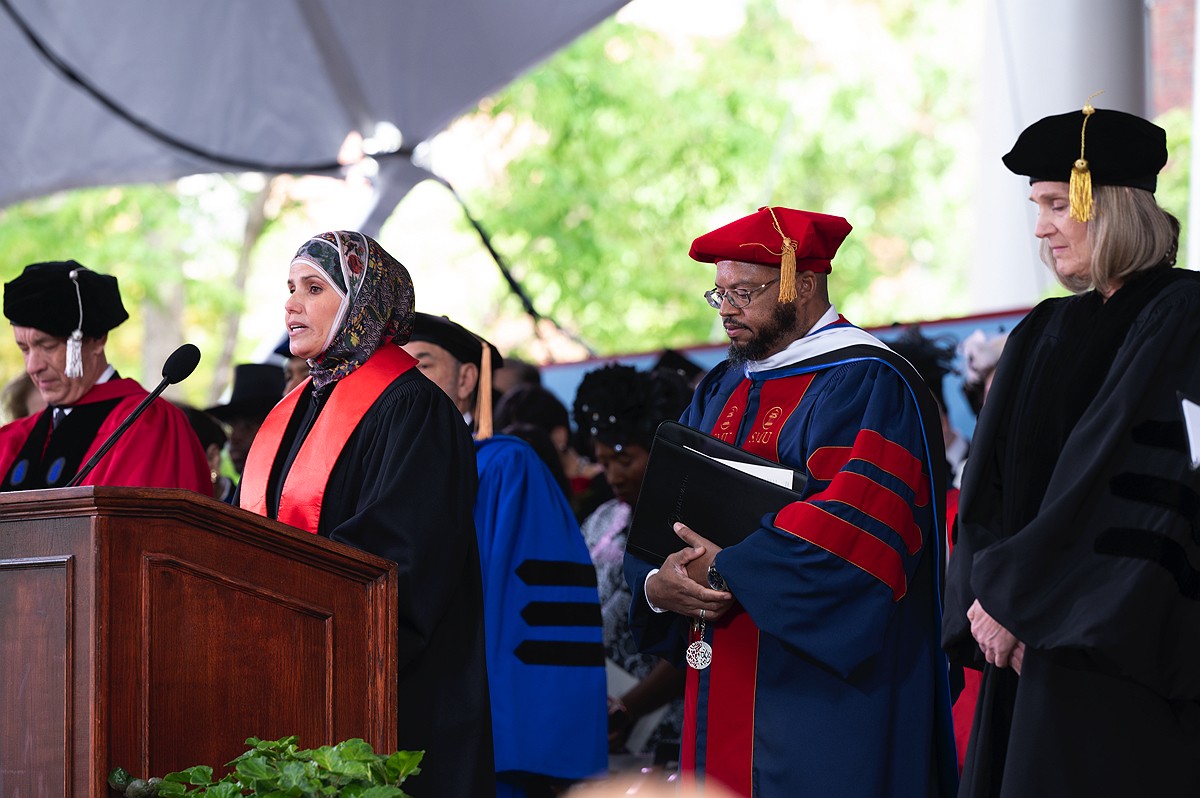
From left: Chaplain Samia Omar, Chaplain Kahlil Abdur-Rashid, and University Marshal Katherine O'Dair
Photograph by Jim Harrison
Following the next anthem (Domine, salvum fac), President Bacow welcomed everyone, and asked the graduates to thank all those “who have supported you on this journey” by turning around to applaud parents, family members, and friends present and watching from around the world. With a brisk, “Now, let’s begin,” he introduced the student speakers seriatim for their big parts; read about each orator here.
• Latin Salutatory. Josiah Ethan Meadows ’23, “De Fructibus Institutionis Harvardianae” (“The Value of a Harvard Education”)
As an 11-year-old, Josiah Meadows went to summer camp at the Academy Vivarium Novum, in Rome, where the campers were permitted to speak only in Latin or ancient Greek. With five years of Latin studies already under his belt, Camper Meadows fit right in: homeschooled, he and his four sisters got a classical education, as befits someone who grew up in Athens, Georgia. At Harvard, the Winthrop House resident concentrated in government, with economics as a secondary field—useful preparation for his new job at a venture-capital firm.
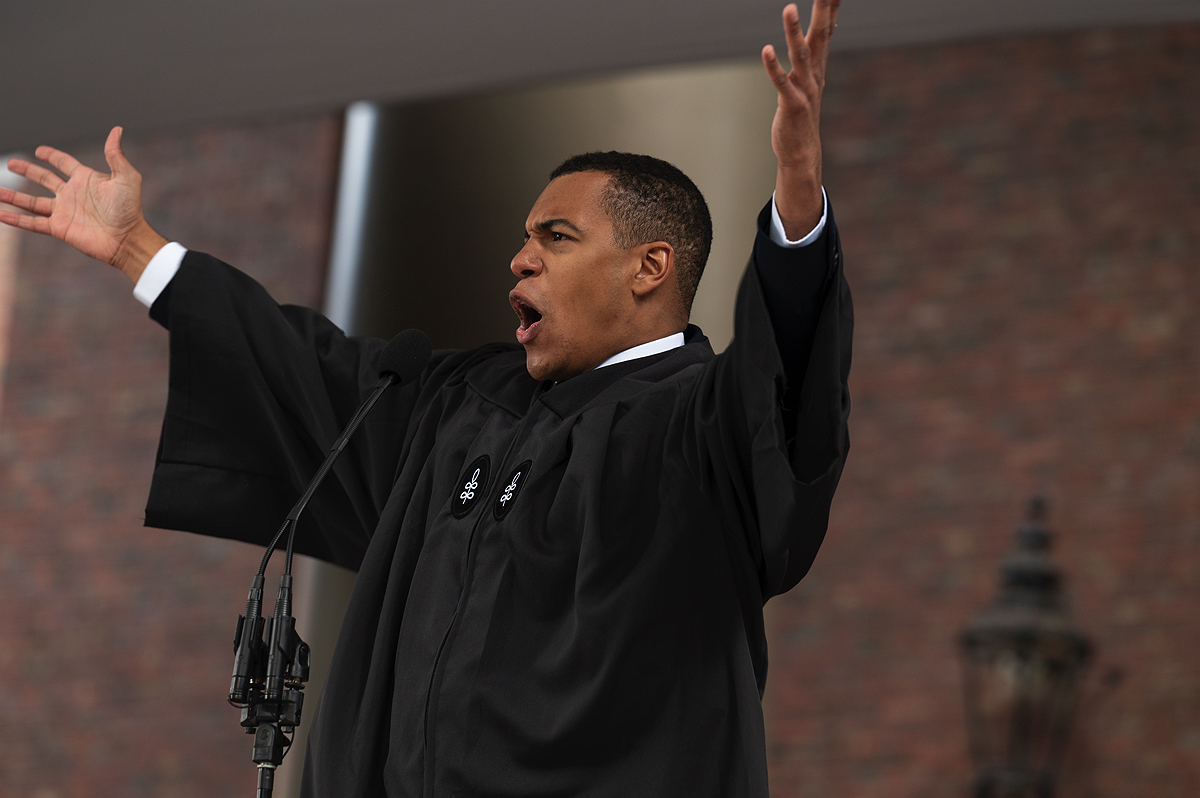
Josiah Ethan Meadows
Photograph by Jim Harrison
In his Commencement role, Meadows nodded less to the orators of ancient Athens or the Roman Forum, and more to the day’s guest speaker to come, noting that he now shares “something in common with the illustrious men of history who stood here, such as Winston Churchill, John F. Kennedy, and Forrest Gump” (“Vinstonio Churchill et Johanne Kennedy ac Forresto Gump”). He deftly cut in snippets of English and ancient Greek, all presented in an animated, robust delivery.
As for the value of the past four years, Meadows continued, “a Harvard education produces citizens who are skilled in the art of rhetoric.” It also inculcates the habit of thinking—about subjects refined and quotidian: “In law and politics, we contemplated the social; in science and medicine, the natural; in literature and poetry, the beautiful; in astronomy and mathematics, the eternal; in philosophy and theology, the Good. Above all, in the most popular field of economics, we contemplated…money?” In place of Descartes’s “I think, therefore I am” (Cogito, ergo sum), contemporary classmates “learned a similar dictum: Covido, ergo Zoom (‘COVID, therefore Zoom’).”
Ending on a spiritual note, he invoked the friendships forged in College this way: “And though I say it today, rendering thanks to Almighty God, the inexhaustible fountain of wisdom, and smiling upon these shining years we have enjoyed together in the bloom of our youth, let this not be the last time we say, farewell.”
Whereupon Hanks bounded across the platform to offer a handshake and kneeling salute to Meadows.
Read Meadows’s full text with an English translation here.
• Senior English Address. Pallas Chou ’23, “Enzymes”
Curious as a Bay Area youth, Pallas Chou liked nothing better than concocting homemade lipsticks and cleaning solutions. As an undergraduate, the chemical and physical biology concentrator, a Cabot House resident, immersed herself studying enzymes in the laboratory of Emily Balskus. Her address draws, metaphorically, on her science: how students collaborate to catalyze something bigger than themselves—work Chou did, too, in student government and through a remote tutoring nonprofit she helped to establish in early 2020, aimed at K-12 students in under-resourced schools. She’s committed to science and has more to do in the academy: after graduation, Chou returns to California, to begin work toward a doctorate in chemical biology at Stanford.
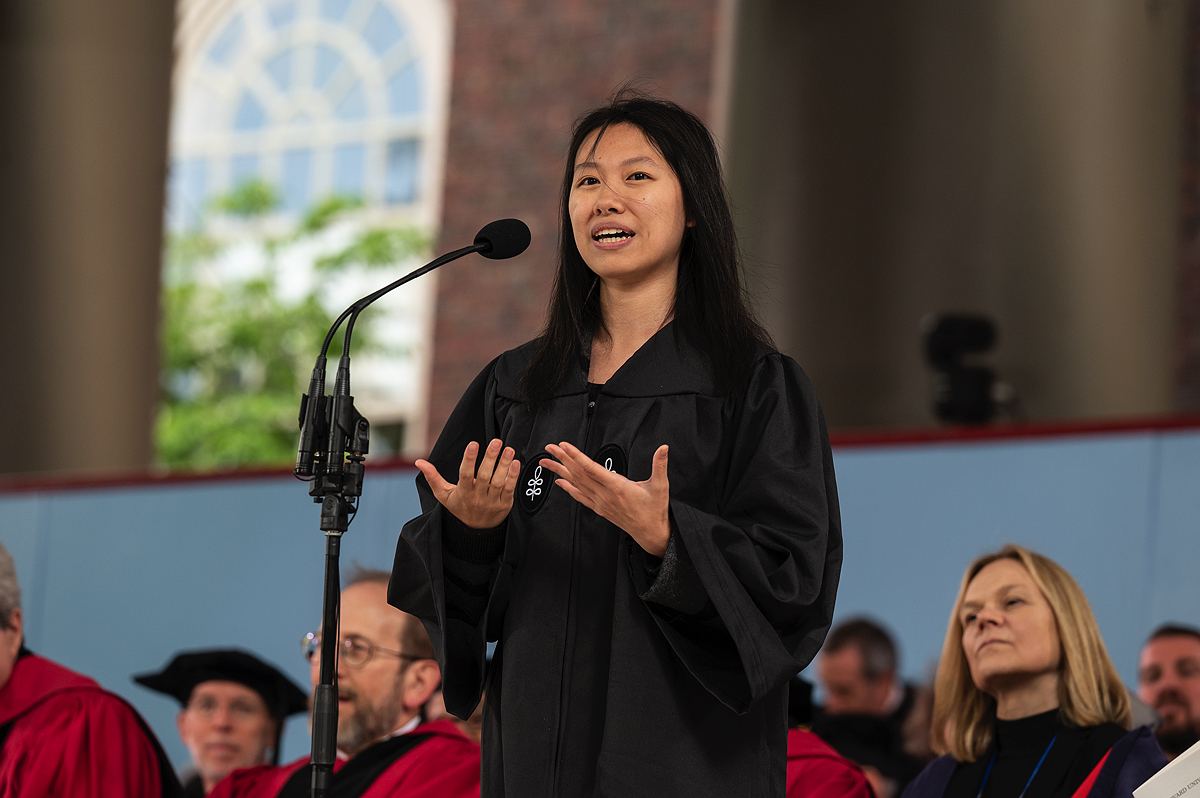
Pallas Chou
Photograph by Jim Harrison
As she instructed her classmates and the rest of the Commencement crowd, “[A]n enzyme’s structure is not only determined by the DNA that encodes it. Other enzymes in the cell, as well as the surrounding environment, help shape the enzyme. From our first year to now, we have been together through ups and downs, shaping each other. We’ve scrambled for boxes, toilet paper, and mute buttons as the world was shutting down in 2020. We’ve lived through a pandemic that has reconstructed our perception of what education can be. We’ve comforted each other as we grieved the loss of loved ones. We’ve met inspiring professors who help us grow and classmates who are musicians, magicians, and mountaineers who never fail to encourage us. For many of us, it was a long journey to get here, to be sitting here today in the theater.”
And the ensuing reaction? “[T]oday, we will celebrate.” After she did, Hanks obliged, celebrating her talk with vivid congratulations.
Read Chou’s full text here.
• Graduate English Address. Vic Hogg, M.P.P. ’23, “The Next Step”
Vic Hogg, the University’s first nonbinary Commencement speaker, thanked all their peers who helped make this final semester possible: Hogg was shot in December 2022 while shopping near home in Michigan during a carjacking gone wrong. A member of the Nottawaseppi Huron Band of Potawatomi, Hogg studied psychology at Yale and thought about pursuing a doctoral degree until a mentor suggested a career in policy, leading ultimately to this year’s Native American in Public Service Fellowship at the Kennedy School, where they have focused on learning about the practical aspects of activism. Once healed, Hogg hopes to return to Michigan, to work “at the intersection of conservation, land, and indigenous governance…support[ing] Michigan tribes and stewarding lands and the lakes.”
Reflecting on the traumatic event of last December, Hogg recalled for the Commencement crowd wondering, “[W]ill my family have to attend my funeral instead of my commencement? Have I spent all this time preparing for a future that I won’t have?” Struggling at rehabilitation, “Limping through a bleak Michigan winter at a snail’s pace” supported by “my mom on one side and a friend on the other, I started to move forward.
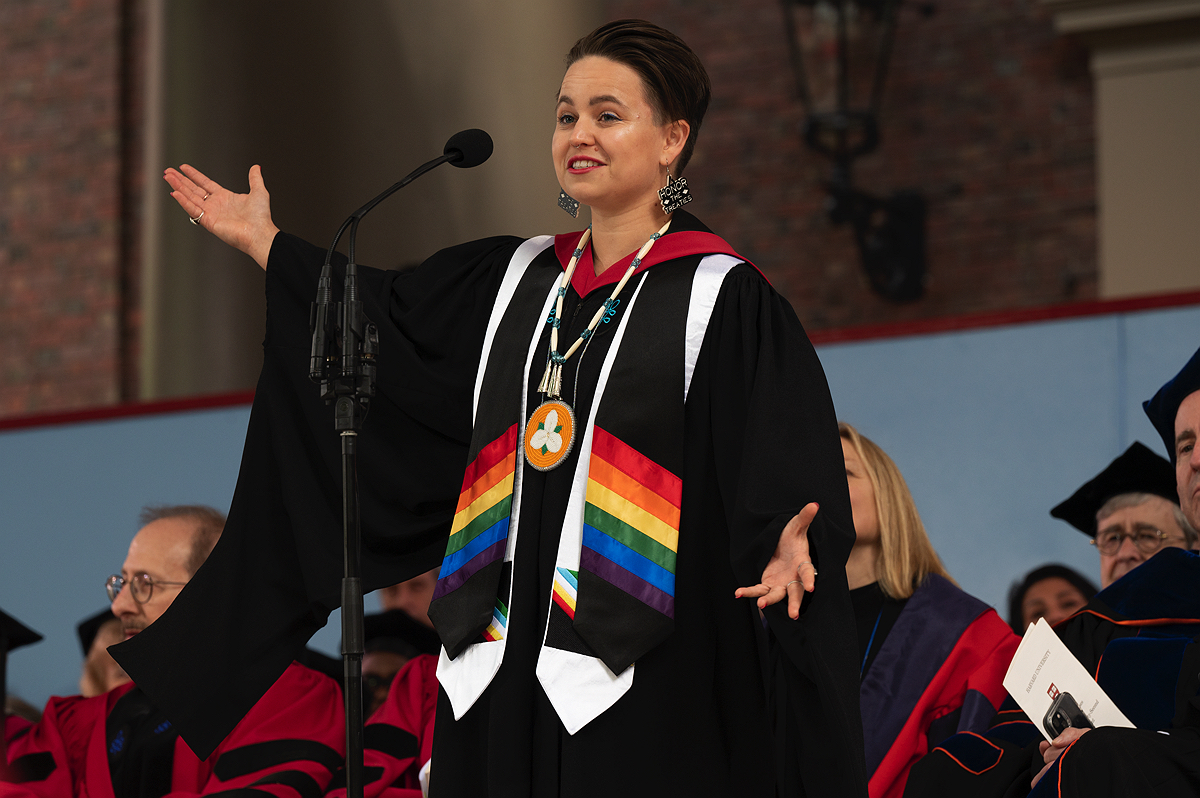
Vic Hogg
Photograph by Jim Harrison
“I came to realize I didn’t need to see the destination—all I needed to see was one next step,” Hogg continued. “We’re here because we have big dreams, and it can be scary to even imagine reaching them. In moments of uncertainty, look for the next step. You haven’t solved immigrant justice, but you can keep doing Duolingo so you can talk to your clients in their own language. You haven’t solved residential segregation, but you can show up to the community meeting on affordable housing. And when all else fails, you can just get eight hours of sleep, or eat something other than pizza.”
Honoring their supportive community, Hogg said, “The poet Gwendolyn Brooks wrote, ‘we are each other’s harvest: we are each other’s business: we are each other’s magnitude and bond.’ I was fortunate to find my harvest here at Harvard.”
Hanks, whom Hogg said was their mother’s hero, conferred a hug and—stage-directing—asked Hogg to point out said mom, and then told Hogg, “Tell her I love her.”
Read Hogg’s full text here.
The Commencement Choir then sang “Threads of Joy,” an anthem based on a poem from Laura Foley’s Syringa, set to music by Dale Trumbore.
• Conferring of degrees. And then came the main event: elevating students into graduates, the real work of the day entrusted to Provost Garber and, by his speech acts of conferral, President Bacow.
As the proceedings began with the long-studying, hard-working candidates for Ph.D. degrees, Garber introduced Claudine Gay “for the final time in this role, the Dean of the Faculty of Arts and Sciences—and for the first time on this platform, in anticipation of her new role—the President-elect of Harvard University.” After a resounding ovation, Gay acknowledged the provost’s words and the applause with a quiet thank you and—before turning to the degrees—said, “This is your day, not mine.”
(Provost-to-provost-to-be, Garber would subsequently introduce with “deep appreciation for his years of dedicated leadership and service, and with good wishes for providential times to come” School of Engineering and Applied Sciences Dean Frank Doyle—about to become provost at Brown University, in Providence, Rhode Island. Garber also acknowledged with “deep appreciation for his years of dedicated leadership and service” Divinity School Dean David N. Hempton and, with a switch to “her” tenure, School of Public Health Dean Michelle Williams, both of whom are stepping down, too. Gay and Garber have been putting a lot of time into the searches for successor deans in FAS and these three other faculties.)
The conferral of Graduate School of Arts and Sciences, engineering and applied sciences, and University Extension degrees proceeded with little interruption of the official rigmarole, and then the Choir performed the anthem based on Psalm 78 (St. Martin’s), a tradition dating back to the inception of Harvard Commencements.
The professional schools then had their more unruly turn. Medical School Dean George Daley understandably went off script to shout out parental “love and pride” for son Nicholas Edmondson Daley ’23, graduating with the Leverett House contingent. As the students progressively got into it, Garber devolved from his command that each group “will rise” to noting when they “have risen” (the Divinity School students, appropriately), and finally dispensed with those words completely later in the proceedings. Dean Hempton introduced his students “one last time,” and Dean Williams began by proclaiming “I love public health!” (to which Bacow responded, “And so do we!”). She lauded her “fabuous school and faculty” and “these very loud, very capable, very committed students.” They were loud. Education Dean Bridget Terry Long bowed to the governing boards and, anent a famous Hanks role, “Mister Rogers, one of the great educators of our time.” And why not?
After these new graduates were sent toward their professions, the Choir sang the beautiful “For the Splendor of Creation”—and it was the undergraduates’ big moment. Alongside the hand-shaking Bacow, Hanks fist-bumped the class marshals and summa cum laudes.
The Honorands
A compact cohort of six honorary-degree recipients (described in detail here) were then lauded for their accomplishments by the provost and formally honored by the president, who read the citation for each and conferred Harvard degrees, in this order:
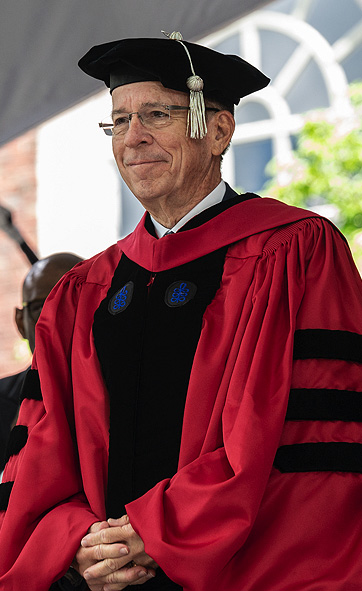
Adm. Michael G. Mullen
Photograph by Jim Harrison
Adm. Michael G. Mullen, Ret., was the seventeenth Chairman of the Joint Chiefs of Staff, serving as the highest-ranking officer in the U.S. military under both Presidents George H. W. Bush and Barack Obama from October 1, 2007, until October 1, 2011—one month before his retirement after 43 years of service. He is perhaps best known to the public for his role, as Chairman of the Joint Chiefs, in supporting repeal of the “Don’t Ask, Don’t Tell” policy that barred gays and lesbians from openly serving in the military. The provost noted, “His father was a Hollywood press agent whose clients included the entertainer Bob Hope. His mother worked with the comedian Jimmy Durante. But their son took a different route—as a different kind of stand-up guy.” Doctor of Laws:
An admirable admiral adroit and adaptable
in advancing America’s interests abroad;
buoyed by faith in his forces’ devotion,
through turbulent waters he anchors a way.
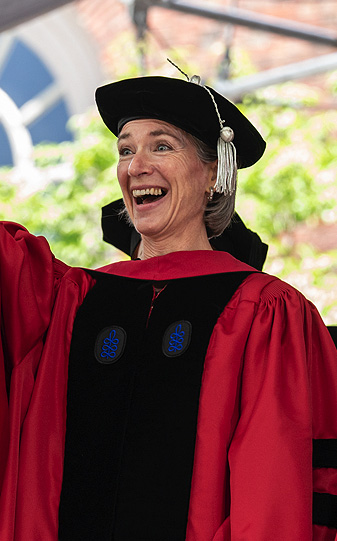
Jennifer A. Doudna
Photograph by Jim Harrison
Jennifer A. Doudna, Ph.D. ’89, Li Ka Shing Chancellor’s professor of biomedical sciences at the University of California, Berkeley, shared the 2020 Nobel Prize in Chemistry for “the development of a method for genome editing,” the powerful “genetic scissors” named CRISPR/Cas9 (“clustered regularly interspaced short palindromic repeats,” including “CRISPR-associated” or “Cas” genetic sequences). The technique is now widely used in biological research, accelerating the discovery of cures for diseases, enhancing agriculture, and holding forth the promise of addressing inherited illnesses. “Her work,” the provost said, “is a classic example of how research propelled by the sheer human passion to understand the world holds promise to change the world.” Doctor of Science:
Deft in devising molecular scissors,
percipient in parsing palindromic repeats,
an edifying editor of the letters of life,
whose scientific insights couldn’t be crisper.
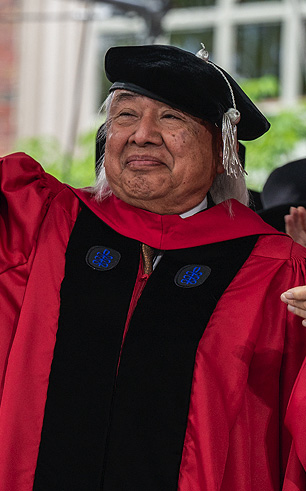
Hugo Morales
Photograph by Jim Harrison
Hugo Morales ’72, J.D. ’75, profiled by this magazine in 2007, is a native of Oaxaca, Mexico, who grew up in California. Radio Bilingüe, which he founded in Fresno in 1976, is the nation’s only public Spanish-language radio network, featuring Linea Abierta (“Open Line”), a Spanish-language live weekday talk show, and the Noticiero Latino news service. It offers music, cultural and informational programs, and news to audiences across the United States, Mexico, and Puerto Rico—all on a nonprofit basis. Doctor of Humane Letters:
An impassioned pathbreaker in public media,
creating new spaces for voices unheard;
he awakens the airwaves to inform and inspire,
making service to others his station in life.
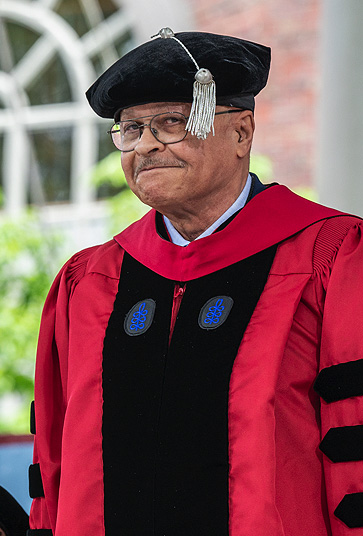
David Levering Lewis
Photograph by Jim Harrison
David Levering Lewis, an historian of the French Third Republic and twentieth-century America and civil rights, is best known for his work on alumnus W.E.B. Du Bois, A.B. 1890, Ph.D. ’95 (the first African American to earn a Harvard doctorate, author of The Souls of Black Folk, and a co-founder of the National Association for the Advancement of Colored People). The first volume, W.E.B. Du Bois: Biography of a Race, 1868-1919 (1993), received the 1994 Bancroft Prize in American History, Francis Parkman Prize, and Pulitzer Prize for biography. The second, W.E.B. Du Bois: The Fight for Equality and the American Century, 1919-1963 (2000), also received the Pulitzer Prize for biography—making Lewis the first author to win Pulitzers for biography for two successive volumes on the same subject. The provost paused the proceedings on this “doubly special occasion” to lead in singing the honorand a “Happy Birthday.” Doctor of Laws:
A premier painter of portraits of progress,
capacious in intellect, perspicacious in insight;
his sagacious scholarship and elegant prose
illumine the contours of consequential lives.
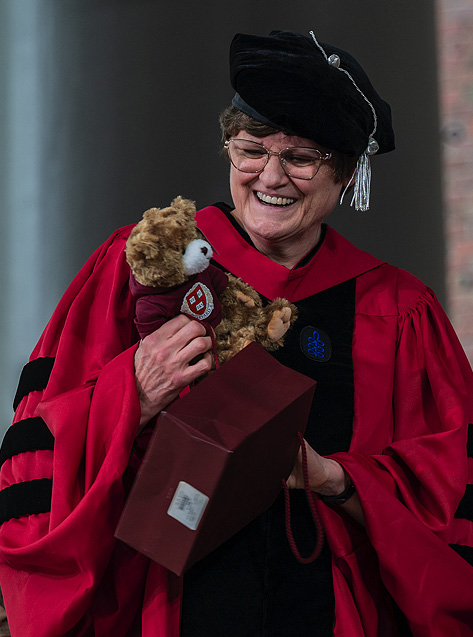
Katalin Karikó
Photograph by Jim Harrison
Katalin Karikó, past adjunct professor of neurosurgery at the University of Pennsylvania and senior vice president at BioNTech Pharmaceuticals from 2013 to 2022, now professor at the University of Szeged, her alma mater, is a Hungarian-born biochemist who overcame repeated obstacles in education and her academic work; the provost, using a line with Harvard resonances, said, “Nevertheless, she persisted” (a big applause line). The honorand has led fundamental research focused on messenger RNA (mRNA): the vehicle for carrying instructions from DNA to the protein-fabricating machinery within each cell. That basic research, in collaboration with Penn colleague Drew Weissman, underpinned the successful vaccines made by Pfizer-BioNTech and Moderna—and thereby saved millions of lives during the COVID-19 pandemic. The provost quoted her as saying of the many honors she has earned, “For me, the greatest recognition was the letter I received from a nursing home where everyone had been vaccinated during the outbreak… [N]o one had died, and they thanked me.” Along with her diploma, University Secretary Marc Goodheart conferred a Harvard teddy bear—a reminder of her daughter’s toy in which the family hid money when they left Hungary in 1985. Kariko got a huge ovation, and public-health graduates were in tears. Doctor of Science:
A catalytic agent in the quest to conquer COVID,
a paragon of perseverance in the face of doubt,
a resolute investigator whose transformative research
royally deserves our Crimson corona.
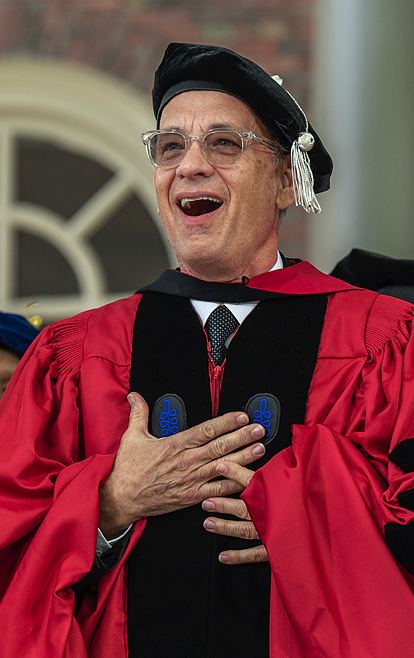
Thomas J. Hanks
Photograph by Jim Harrison
Thomas J. Hanks, the guest speaker, is widely known for comedic roles in Splash, Big, and A League of Their Own, and has won Academy Awards for best actor for his dramatic performances in Philadelphia and Forrest Gump. His other credits range from Sleepless in Seattle and You’ve Got Mail to Apollo 13 and voicing Woody in Toy Story. He collaborated with Steven Spielberg, Ar.D. ’16, on several films, and has won multiple Emmy Awards for producing limited series and television movies such as Band of Brothers and John Adams. His debut novel, The Making of Another Major Motion Picture Masterpiece, was published May 9. “When a publication took a poll a decade ago, asking respondents to name the most trusted person in America,” the provost noted, “he finished on top,”—and then went on to “present our academy’s award to…the envelope please [delivered by Goodheart]…Tom Hanks.” With his degree, Hanks got a Harvard volleyball—a reference to his companion in Cast Away. Doctor of Arts:
Wilson’s bestie, Buzz’s buddy, Ryan’s savior, America’s dad;
with wit and grace, grit and gumption,
his performances tap the heart and soul
and show us why in Tom we trust.
Then it was time for the actor to perform.
The Commencement Address, by Tom Hanks: “Keeping the Promises of Our Promised Land”
Bacow made the segue to Hanks, but before he began, there was another surprise: an antic, frantic, Tom Lehrer-style Hasty Pudding send-up of his acting career, made up of movie titles and roles, and concluding in a pitch for Asteroid City—in which he appears, opening June 16. (The inventive students were lyricists Maureen Clare ’24 and Mireya Sanchez-Maes ’24; the performers included pianist Ian Chan ’23, principal vocalist Taylor Kruse ’23, backing vocalists Odessa Deng ’23 and Andrew Van Camp ’23—and Maureen on the triangle.)
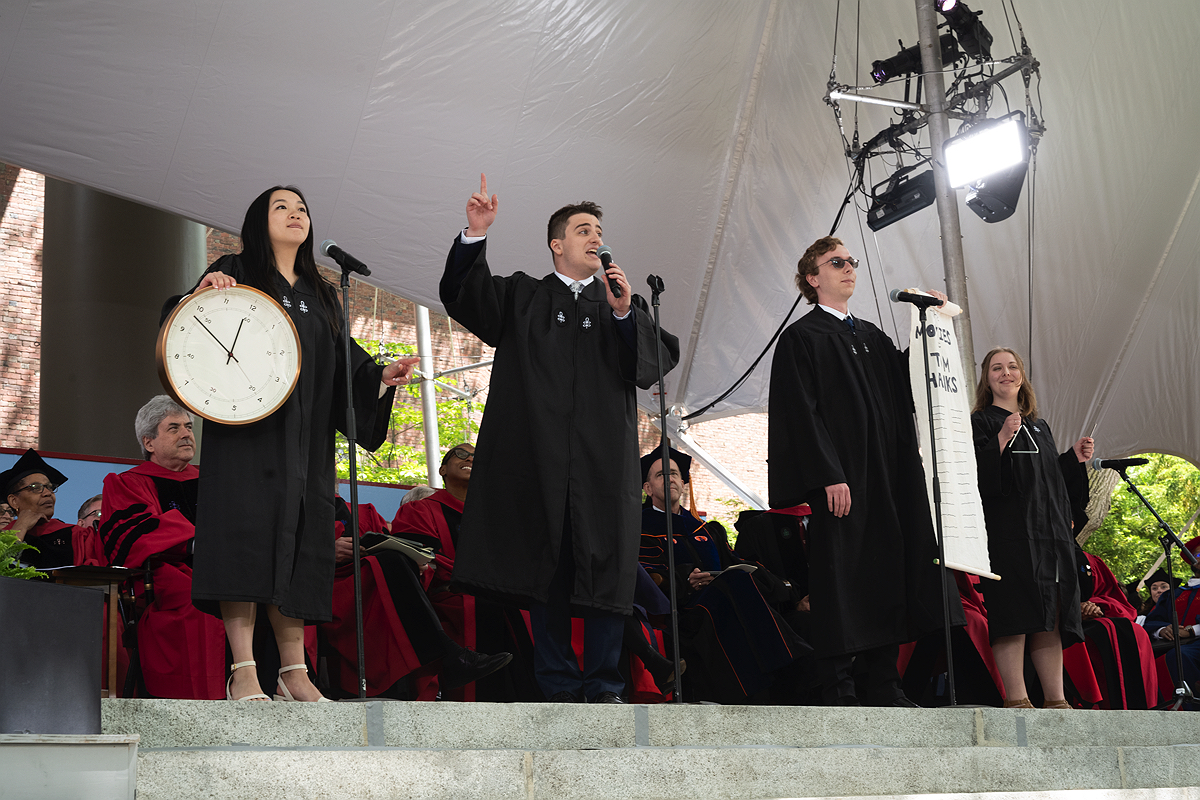
The Hasty Pudding performers, left to right: Odessa Deng, Taylor Kruse, Andrew Van Camp, and Maureen Clare. Not pictured: Ian Chan on piano.
Photograph by Jim Harrison
The guest speaker, who is living proof that one need not acquire a fancy degree to live a fulfilling, productive life, began amusingly and self-deprecatingly, saying, “It’s not fair, but please don’t be embittered—without a lick of work, without once having walked into that library [gesturing across Tercentenary Theatre to Widener]…I make a damn good living playing someone who did. It’s the way of the world, kids."
Turning to his prepared remarks, he said, “On behalf of all of us who have studied for two years at Chabot Community College in Hayward, California, two semesters of California State University, Sacramento, and 45 years at the School of Hard Knocks, earning a Bachelor of Arts Degree in One-Damn-Thing-After-Another—yeah, appreciate being here, thank you, Harvard, about time...” He then improvised further, saying that absent any command of Latin, enzymes, or public policy, “I am the closer for Josiah, Pallas, and Vic.”
In what turned out to be a powerful speech on Truth (Veritas) and threats to America, he started by riffing on superheroes, beginning with Superman, who enlisted in “that never-ending battle for Truth, Justice, and the American Way.” But he pivoted quickly to reality, pointing out that there are no real Supermen to make life work out. And the stakes, he said, are especially high today, because “we all are in a cage match, mixed martial arts battle royale with agents of intolerance, ignorance, and braying incompetence, the malevolent equals to Imperial Storm Troopers, Lex Luthor, and Loki.”
Bringing the graduates down to Earth, Hanks said:
[W]e know that to each other, we often seem like strange beings from another planet—in habits and tastes and languages, with holidays and foods we eat and even names for the days of the week all varying. We all have special powers and abilities far beyond the reach of other mortals…some of us can repair a screen door with ease. Take care of a five-year old kid and a toddler for 24 hours a day and never stop loving them…make sense of physics and economics and global policy…survive somehow on minimum earnings…graduate from college despite years of lock-down and Zooms. These achievements are all stellar even though, yes, we are all but human. Still, we’d like to look up in the sky and see not a bird, not a plane, but, well, someone who’s young, strong, and super, who’ll fight the never-ending battle for Truth, for Justice and for the American way—someone who will take on that work.
“That work,” he continued, “is the keeping of the promises of our promised land, the practice of decency, the protection of freedom, and the promotion of liberty for all—with no exceptions.” Doing so, and upholding the American Way, Hanks said, “can be exampled when you respect the law and the rights of all because if you don’t, who will? When your food is brought to you and you thank the server, because if you don’t, who will? When you pick up the litter that missed the recycling bin, because if you don’t, who will? When you vote your conscience and make sure your neighbor has the opportunity to do the same with theirs, because if you don’t, who will? When you make good on your victories and learn from your losses because if you don’t, who will?”
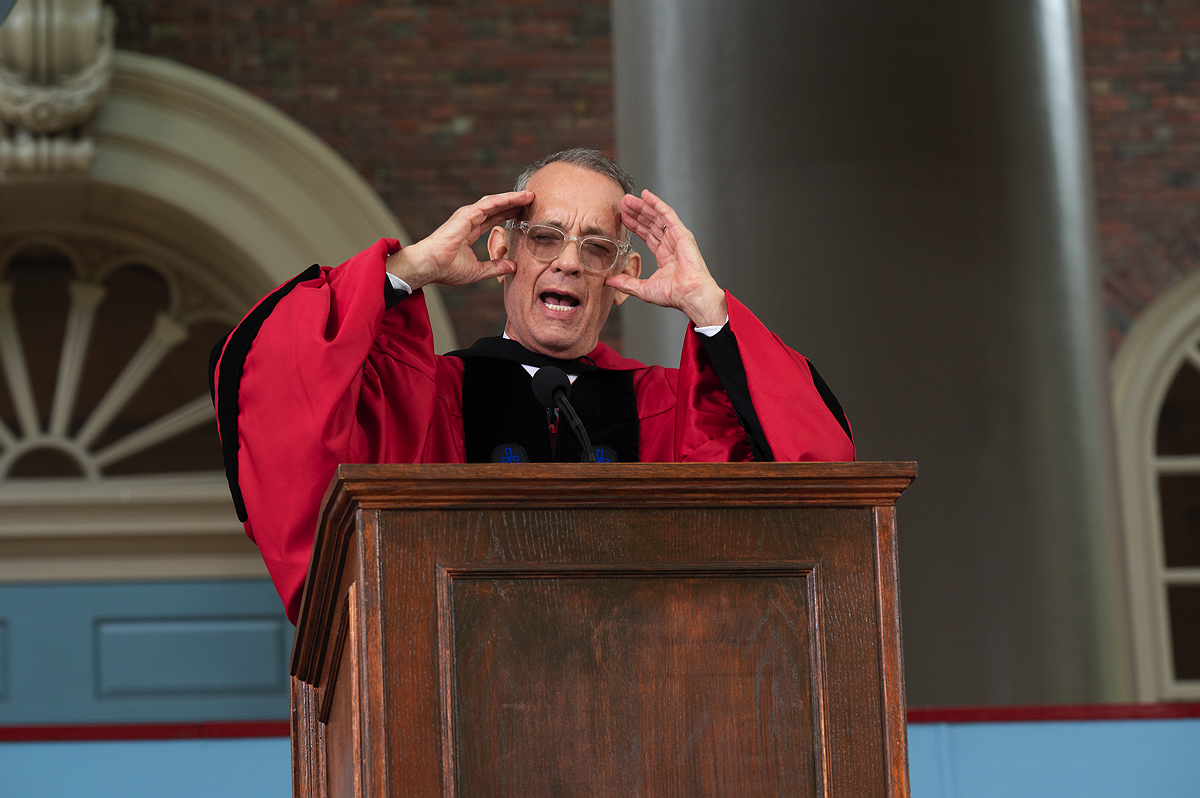
Tom Hanks
Photograph by Jim Harrison
The American Way, he noted, took root here, in the American Revolution, despite chattel slavery, despite the relegation of Native Americans to subhuman status. Now, “All of us, no exceptions, are entitled to inalienable rights of liberty and freedom because…we live in the United States of America.”
But those rights are under attack because they depend on “the language of telling the Truth,” and “Truth to some, is no longer empirical, no longer based on data, nor common sense, nor even common decency—telling the truth is no longer the benchmark for public service, no longer the salve to our fears nor the guide to our actions.” Truth is vulnerable to those who “play fast and loose” with synonyms for truth such as honesty and honor “to create enemies, to claim victimhood, to raise the mediocre into merit, and to make cloudy a vista that is actually crystal clear.” Most of all, it is vulnerable to indifference:
Indifference will rust away the promise of our promised land. Propaganda and Bald-faced Lies will erode [it] over time. Idolatry and Imagery lose luster and effect over time. Ignorance and Intolerance can be replaced by experience in the wink of an eye. But Indifference will narrow the vision of America’s people and make dim the light of Lady Liberty’s symbolic torch. Indifference makes citizens into indentured servants held in labor by the despots and tyrants…surging into the vacuum caused by the Indifference of a people who have been made weary by struggle, so weary that they lose hope and are left to yearn to be saved by the fiction of superheroes.
[T]here is a choice to be made, the same option for all grownups: to be one of three types of Americans—those who embrace liberty and freedom FOR ALL, those who won’t, or those who are indifferent. Only the first do the work of creating a more perfect union, a nation indivisible. The rest just get in the way. In the neverending battle you have all officially joined as of today, the difference is in how truly you believe, in how vociferously you promote, in how tightly you hold to the Truth that is self-evident—that of course we are all created equally yet differently, and of course we are all in this together. If we do the work together, Justice and the American way are within our grasp no matter our gender, our faith, our station, our heritage, our genetic makeup, the shade and hue of our flesh, or the continental birthplace of our ancestors. Why is that truth so hard for some to accept—much less respect? If you live in the United States of America, the responsibility is yours, ours. The effort is optional. Truth is sacred, unalterable, chiseled into the stone of the foundation of our republic.…None of us are super…we are all but human.
Read Hanks’s address here.
After a sustained ovation, Provost Garber formally thanked “Doctor Hanks”—and then made way for valedictory remarks by Bacow “as he prepares to step down from his role this summer, after a singular career of leadership and service at Harvard and for all of higher education.” Garber acknowledged and warmly thanked “the twenty-ninth President of Harvard University, my extraordinary colleague and good friend, Larry Bacow.”
The President’s Farewell
As they wondered what the future might hold for them, Bacow told the new graduates, “I can relate to that. This is my last Commencement, and I am pondering the same question. Like you, I am contemplating what happens next.” He wished for all of them “what you wish for yourself—and I hope that living a meaningful life is high on your list. What do I mean by that?” Sounding themes he has long emphasized, he lauded their hard work, but noted that “you are also extremely fortunate to be sitting here today.” With education and good fortune “comes responsibility, including looking beyond your success to help others.”
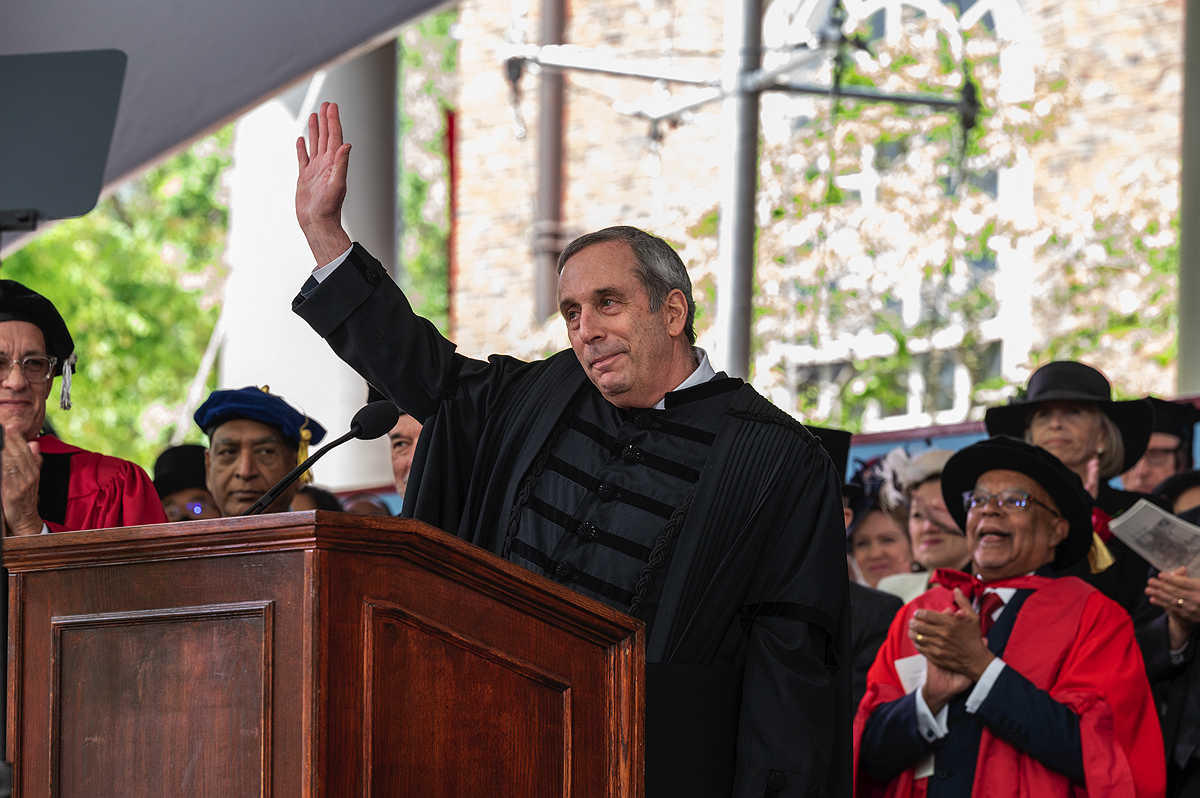
President Lawrence S. Bacow
Photograph by Jim Harrison
The president urged the graduates to recognize not only supportive family and friends but also the “countless others” in their lives:
For example, those who pushed and encouraged you, and who may have recognized something in you that you did not recognize in yourself; those who had confidence in you even before you proved yourself worthy of their trust; those who extended themselves to open doors for you. And to all these, you can add the invisible others: those who volunteered their time to create organizations that have been central to your life; those who worked to build institutions that nurtured your capacities, talents, and ambitions; those who helped to sustain and strengthen this great university, which I hope has left its mark on you, and from which you now graduate.
Among their responsibilities, Bacow said, was to engage in making an imperfect world better.
In a personal vein, he said:
Harvard gave me a great education, but it also raised my expectations for myself. It opened my eyes to what is possible. At my Commencement [Bacow is M.P.P.-J.D. ’76, Ph.D. ’78], I never imagined that someday I would be standing here giving the final remarks at your Commencement. I hope—as you find your way through life—that you will have similarly pleasant surprises.
And now, to all of those who helped me along the path of life, to those who gave me opportunities that I never could have imagined, to those who gave me the extraordinary responsibility to lead Harvard over these past five years, thank you. And to Adele, my wife of 48 years who has been my partner on this incredible journey and all others, thank you, I love you.
During that journey, he concluded, addressing the class of 2023 directly, “[T]hank you for teaching me so well. I am grateful to each and every one of you for being a constant source of hope and optimism. Serving as your president has been the privilege of my life. I look forward eagerly to celebrating all that you will do for the world—and all whose lives will be made better by your good work.”
Read President Bacow’s remarks here.
Denouement
O’Dair then asked all to rise for “Fair Harvard,” following which Pusey Minister Matthew I. Potts offered the benediction. A blessing, he said, acknowledges “that which is already good.” In that spirit, on behalf of all particpating, he said to the graduates, “We see you. We see how good you all are.” Citing their resilience and rigor, and their courage, Potts said, “We see so much good in you and we also see a world in perilous need…of you.” He concluded, “Become for our world the blessing you have already been to us. Amen.”
The sheriff then returned to the fore, staff in hand, to shatter the quiet and adjourn what used to be considered the “morning exercises” at 28 minutes past noon, the ringing of bells—the perfect conclusion to a long, fulfilling commencing.
•••••••••••
Check back at www.harvardmagazine.com for continuing coverage of:
• Radcliffe Day, May 26, honoring global health pioneer Ophelia Dahl, and the accompanying panel on women's leadership in global healthcare (both now live).
• Harvard Alumni Day, June 2, with guest speaker Mary Louise Kelly ’93, co-host of National Public Radio’s All Things Considered.
